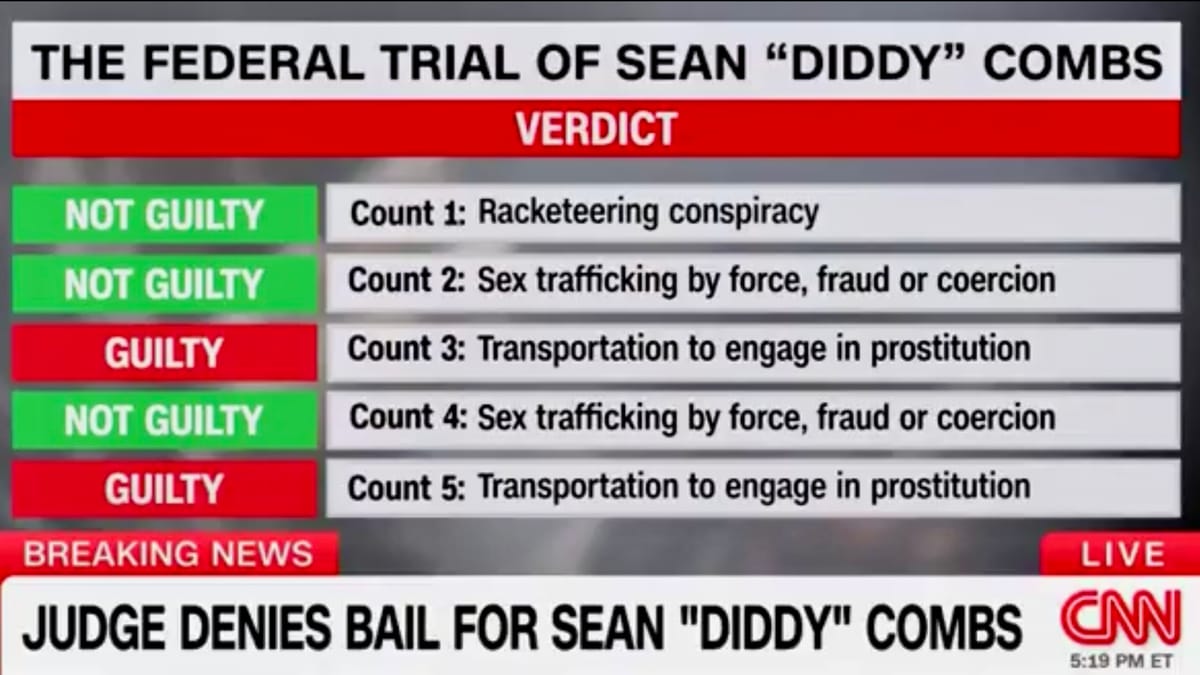Jury: Diddy Didn't Did It!
Rapper acquitted on racketeering, sex trafficking charges; only convicted of prostitution

Sean “Diddy” Combs has been acquitted of racketeering and sex trafficking charges. He was convicted on two federal counts of transporting individuals across state lines for prostitution under the Mann Act. He now faces up to 20 years in prison—though experts suggest he could serve only months.
Legal specialists, including former federal prosecutors Mitchell Epner and Neama Rahmani, argue sentencing guidelines point to a term of 15 to 21 months, not years. With nearly ten months already served since his September 2024 arrest, Combs may soon receive “time served” or only minimal additional time.
Rahmani described the case as “a huge overwhelming win by the defense and a tremendous loss for the prosecution,” calling it “the most expensive prostitution trial in American history.” He noted that prosecutors built an extensive case around alleged coercive sex parties known as “freak‑offs,” yet failed to secure convictions on trafficking and racketeering, raising questions about overreach in a case estimated to have cost $10 million.
At trial, testimony from two women—former partner Cassie Ventura and a third party identified as “Jane”—detailed coercion into sexual encounters with hired escorts. Ventura described surveillance video showing physical abuse, while Jane recounted coercion involving drugs and threats.
Defense attorneys emphasized that these encounters were consensual, though fraught with complexity, and highlighted that the prosecution chose not to pursue trafficking counts after failing to prove force, fraud, or coercion beyond a reasonable doubt.
The Mann Act, aka the White-Slave Traffic Act of 1910, is a federal law aimed at combating human trafficking and the transportation of individuals across state lines for illegal sexual activity. While its early enforcement was often criticized for being overly broad or morally driven, today the law focuses more narrowly on cases involving coercion, exploitation, or commercial sex acts. In Sean “Diddy” Combs’ case, the government relied on the Mann Act to prosecute him for allegedly arranging and funding travel for women who later engaged in prostitution. Although the jury cleared Combs of sex trafficking, they found sufficient evidence that he had violated the Mann Act by knowingly facilitating interstate travel for illegal purposes.
With Combs cleared of the most serious allegations, sentencing guidelines fall in his favor. While he did deny Combs bail on Wednesday, experts anticipate that Judge Arun Subramanian will consider time served during the sentencing process. While prosecutors have requested a sentence of four to five years, their inability to secure top-tier convictions suggests a lower outcome.
Combs remains incarcerated at the Metropolitan Detention Center in Brooklyn. Sentencing is scheduled for the fall. Despite the conviction, many legal analysts predict a far shorter prison stay than the maximum possible, given Combs’ lack of prior convictions and the relatively limited nature of the offenses. Some have already begun predicting that the rapper’s career will “bounce back” following his release.




